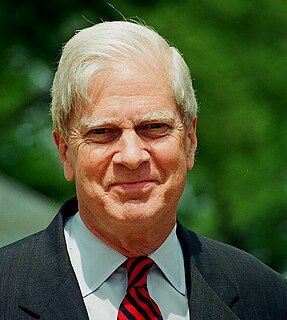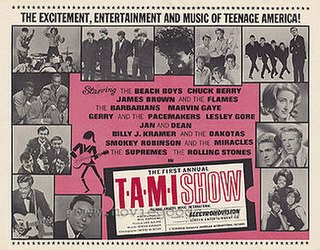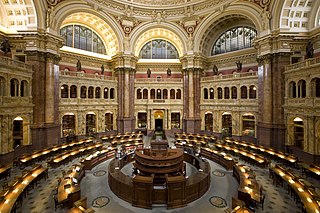The United States National Recording Preservation Board selects recorded sounds for preservation in the Library of Congress' National Recording Registry. The National Recording Registry was initiated to maintain and preserve "sound recordings that are culturally, historically or aesthetically significant"; to be eligible, recordings must be at least ten years old. Members of the Board also advise the Librarian of Congress on ongoing development and implementation of the national recorded sound preservation program.
The National Recording Preservation Board (NRPB) is a federal agency located within the Library of Congress. The NRPB was established by the National Recording Preservation Act of 2000 (Public Law 106–474). [1] This legislation also created both the National Recording Registry and the non-profit National Recording Preservation Foundation, [2] which is loosely affiliated with the National Recording Preservation Board, but the private-sector Foundation (NRPF) and federal Board (NRPB) are separate, legally distinct entities.
The main responsibilities of the board are: [2]
The board is appointed by the Librarian of Congress and is composed of representatives from professional organizations of composers, musicians, musicologists, librarians, archivists and the recording industry. [3] Explicitly it is composed of up to 5 "at-large" members and 17 member/alternate pairs from the following 17 organizations: [2]
The United States National Film Preservation Board (NFPB) is the board selecting films for preservation in the Library of Congress' National Film Registry. It was established by the National Film Preservation Act of 1988. The National Film Registry is meant to preserve up to 25 "culturally, historically or aesthetically significant films" each year; to be eligible, films must be at least 10 years old. Members of the Board also advise the Librarian of Congress on ongoing development and implementation of the national film preservation plan.

The Fall of the House of Usher (1928) is a short silent horror film adaptation of the 1839 short story "The Fall of the House of Usher" by Edgar Allan Poe. The movie was co-directed by James Sibley Watson and Melville Webber, and starred Herbert Stern, Hildegarde Watson, and Melville Webber. It tells the story of a brother and sister who live under a family curse. An avant-garde experimental film running only 13 minutes, the visual element predominates, including shots through prisms to create weird optical distortion. There is no dialogue in the film, though one sequence features letters written in the air moving across the screen.

Harry Partch was an American composer, music theorist, and creator of musical instruments. He composed using scales of unequal intervals in just intonation, and was one of the first 20th-century composers in the West to work systematically with microtonal scales. He built custom-made instruments in these tunings on which to play his compositions, and described his theory and practice in his book Genesis of a Music (1947).

James Hadley Billington was an American academic and author who taught history at Harvard and Princeton before serving for 42 years as CEO of four federal cultural institutions. He served as the 13th Librarian of Congress after being nominated by President Ronald Reagan in 1987, and his appointment was approved unanimously by the U.S. Senate. He retired as Librarian on September 30, 2015.
The Archive of Folk Culture was established in 1928 as the first national collection of American folk music in the United States of America. It was initially part of the Music Division of the Library of Congress and now resides in the American Folklife Center.

"Tutti Frutti", sometimes styled as "Tutti-Frutti", is a song written by Little Richard and Dorothy LaBostrie that was first recorded in 1955, becoming Little Richard's first major hit record. With its energetic refrain, often transcribed as "A-wop-bop-a-loo-mop-a-lop-bam-boom!", and its hard-driving sound and wild lyrics, it became not only a model for many future Little Richard songs, but also a model for rock and roll itself. The song introduced several of rock music's most characteristic musical features, including its loud volume, powerful vocal style, and distinctive beat and rhythm.

The National Recording Registry is a list of sound recordings that "are culturally, historically, or aesthetically significant, and/or inform or reflect life in the United States." The registry was established by the National Recording Preservation Act of 2000, which created the National Recording Preservation Board, whose members are appointed by the Librarian of Congress. The recordings preserved in the United States National Recording Registry form a registry of recordings selected yearly by the National Recording Preservation Board for preservation in the Library of Congress.
The Film Music Society is an international non-profit organization supporting the preservation of music from motion pictures and television programs.
The National Film Preservation Act is the name of several federal laws relating to the identification, acquisition, storage, and dissemination of "films that are culturally, historically, or aesthetically significant."

T.A.M.I. Show is a 1964 concert film released by American International Pictures. It includes performances by numerous popular rock and roll and R&B musicians from the United States and England. The concert was held at the Santa Monica Civic Auditorium on October 28 and 29, 1964. Free tickets were distributed to local high school students. The acronym "T.A.M.I." was used inconsistently in the show's publicity to mean both "Teenage Awards Music International" and "Teen Age Music International".

"Down Hearted Blues" is a blues song composed by musician Lovie Austin, with lyrics by American jazz singer Alberta Hunter. The first line sets the theme for the song: "Gee but it's hard to love someone when that someone don't love you." Hunter sang it during her engagement at the Dreamland Cafe, in Chicago, where she performed with Joe "King" Oliver's band.
The Association for Recorded Sound Collections (ARSC) is a nonprofit organization dedicated to the preservation and study of sound recordings. Established in 1966, members include record collectors, discographers, and audio engineers, together with librarians, curators, archivists, and researchers.
Music librarianship is the area of librarianship that pertains to music collections and their development, cataloging, preservation and maintenance, as well as reference issues connected with musical works and music literature. Music librarians usually have degrees in both music and librarianship. Music librarians deal with standard librarianship duties such as cataloging and reference, but the addition of music scores and recordings to collections complicates these tasks. Therefore, music librarians generally read music and have at least a basic understanding of both music theory and music history to aid in their duties.

The National Film Registry (NFR) is the United States National Film Preservation Board's (NFPB) collection of films selected for preservation, each selected for its historical, cultural and aesthetic contributions since the NFPB’s inception in 1988.

The Library of Congress (LC) is the research library that officially serves the United States Congress and is the de facto national library of the United States. It is the oldest federal cultural institution in the country. The library is housed in three buildings on Capitol Hill in Washington, D.C.; it also maintains a conservation center in Culpeper, Virginia. The library's functions are overseen by the Librarian of Congress, and its buildings are maintained by the Architect of the Capitol. The Library of Congress is one of the largest libraries in the world. Its "collections are universal, not limited by subject, format, or national boundary, and include research materials from all parts of the world and in more than 470 languages."

Tim Brooks is an American television and radio historian, author and retired television executive. He is credited with having helped launch the Sci Fi Channel in 1992 as well as other USA Network projects and channels.
The University of North Texas Libraries is an American academic research library system that serves the constituent colleges and schools of University of North Texas in Denton. The phrase "University of North Texas Libraries" encompasses three aspects: The library collections as a whole and its organizational structure; The physical facilities and digital platform that house the collections; and certain self-contained collections of substantial size that warrant the name "Library"—the Music Library and the Digital Libraries (collections), for example, are housed in Willis Library.

The National Recording Preservation Plan is a strategic guide for the preservation of sound recordings in the United States. It was published in December 2012 by the Council on Library and Information Resources (CLIR) and the National Recording Preservation Board of the Library of Congress. The plan was written by a community of specialists, but is prominently credited to Brenda Nelson-Strauss, Alan Gevinson and Sam Brylawski
Harold Spivacke was an American music librarian and administrator. He was Chief of the Music Division of the Library of Congress from 1937 to 1972. In 1940 he co-founded the National Music Council with Julia Ober, Franklin Dunham, and Edwin Hughes.